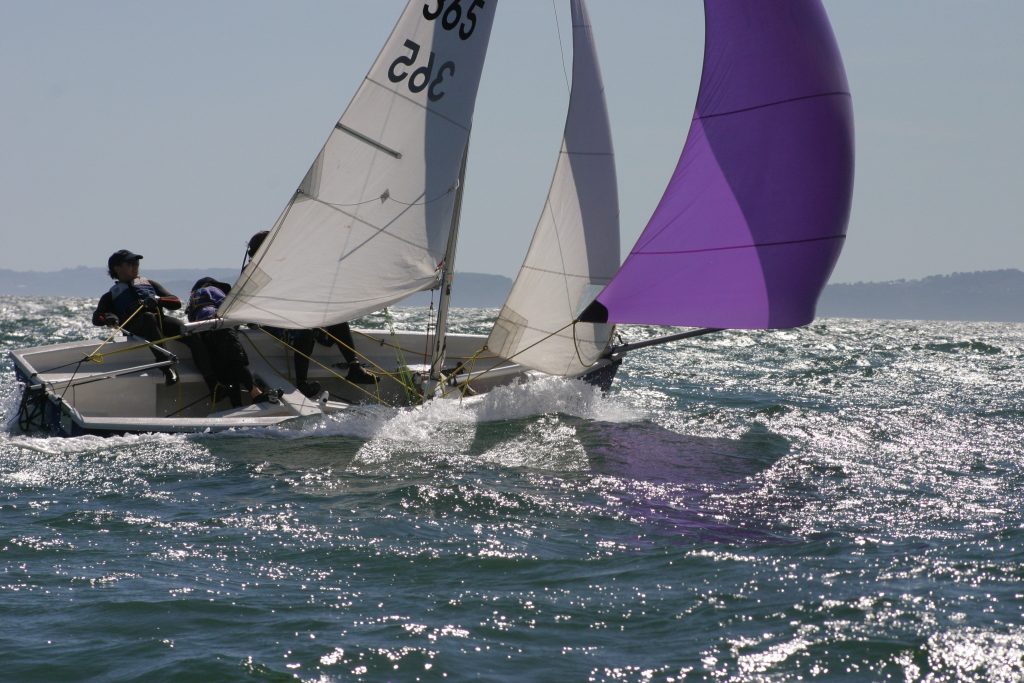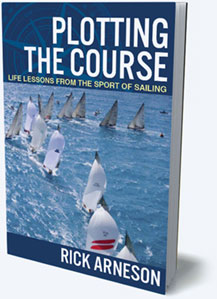
Even though our teenage years come with a unique set of challenges (and everyone can remember some of their own), one of the great things about these formative years is that it’s a period in which we are in constant learning mode. From the day we’re born, learning is a full-time job, and we soak up new information like a sponge soaks up water. Looking back, my steepest learning curve in sailing was in my high school and college years. Not surprisingly, I found that when I began teaching sailing that teens were often easier to teach than adults. Those teenage years are the point at which we develop our approach to processing new information as we progress academically and intellectually. When I was a teenager, sailing helped me to build a foundation for my approach to learning in general, and it served me well over time, on and off the water. Here are some of the lessons that I picked up along the way while learning to sail.
Master the basics of a new subject first, and subtle improvements will follow naturally
Sailing’s a complex sport. The more questions you ask, the more follow-up questions you’ll have. If you start off thinking about the details of why everything works the way it does, it can become pretty confusing. If you can keep to the basics as you get started, however, more advanced concepts will come much easier. I found both as a young student and an instructor of sailing that allowing time to get the hang of basic steering, sail trim, and right-of-way rules before introducing additional information made the learning process go much smoother than rushing the curriculum. This is also true in any academic pursuit. There are a number of subjects, from math to language studies, which you could find yourself struggling through if you try to skip past the foundation work too fast.
Look to multiple sources of information
The more I got into sailing, the more I sought out every nugget of information I could find from any source available. When I was a teen, the internet wasn’t quite what it is now, so I gathered sailing information from books, videos, magazines, and newspaper articles. I’d read about everything from tactics to yacht design. I’d record races or borrow someone else’s videos and watch them over and over. I’d read the latest news about the sport and look closely at photographs to see what made different boats unique, and how they were being sailed. When you’re that passionate about a subject, you can devote lots of time to studying it, and not consider it a chore. There are a number of ways to learn a new subject, and most people have a method that they find most effective for them. New concepts may click with someone the first time they hear someone describe it to them, some need to see it performed, and others need to actually practice or experience it to fully understand it. To have the most thorough understanding of a topic, however, it’s good to vary your resources and use different methods of gathering your information.
Nothing beats experience
We’ve all heard that practice makes perfect. That’s pretty idealistic, since perfection will elude most of us, no matter what we’re practicing for. Practice does, however, make a massive difference in improvement when compared to other methods of learning. For me, my sailing really took off once I started just putting in some more time on the water. I’d go out regularly after school, alone or with others, for one hour or for a few, just to get used to handling the boat and building my reflexes. When I had someone else to practice with, the time was even better spent. It was only a matter of months after starting this new routine that I noticed that my race results had improved. Most subjects or skills that we want to master take regular practice to get the hang of. If you want to learn a new language, you have to speak it. If you want to learn an instrument, you have to play it. Books and video can be great learning tools, but they are often simply supplemental reinforcement to the practice that is necessary for real improvement.
Set a new standard with each improvement you make
One of the most rewarding things in the world is to work hard at something and to see it pay off. When you’ve accomplished a new personal best in your field of interest, it gives you a great feeling and motivates you to keep going in your efforts. To this day, a particularly fond memory is the first time I won a regatta. It was a little club event, and there were probably only five or six boats entered, but getting that 1st place trophy meant the world to me. It was the start of something new, when first place was no longer so far off. A moment like that is a great time to start setting new goals. When you take time to look at where you currently stand in your field, recognizing the progress you’ve made from your early beginnings can be a great motivator in helping you visualize an open road of new successes ahead.
Ask the masters for advice
Sailing is a tight community full of helpful people. Even though we are often competitors, we count on each other to keep our skills sharp. When the experts open up to the newcomers, it not only enhances that feeling of community, but it raises the level of competition as the bottom of the pack moves up. Of course, the champions can’t be expected to give away all their secrets, or they’d be throwing away the advantage they worked so hard to attain. But, more often than not, leaders in the field, whether it’s in sailing or any other area, tend to be pretty receptive to answering a question once in a while from someone who genuinely wants to learn from the best. You don’t have to know them personally; often you can write to them and you’ll get some response. When Steve Jobs was a young boy, he called Bill Hewlett, co-founder of HP, and kept him on the phone asking questions for half an hour. Hewlett was so impressed with the bright and eager young Jobs that he offered him summer jobs. Take polite advantage of the opportunity to ask a leader in your subject of choice for advice, even if it’s to say, “I’m looking to learn as much as I can, so that I can achieve the kind of success you’ve had. Could you offer me any advice?” You’ll find more often than not that the masters not only don’t mind being asked for advice once in a while, but actually appreciate it.
Learn from peers’ stories
Sailors often recap races back at the dock at the end of a day’s racing with their competitors. Discussing what went right or wrong for both sides can be a great way to see the day’s experience from another perspective. Your friends can always be a great source for learning, even if it’s as an example of what not to do. Teenage years can be tough because many of us have more fear of embarrassment at that time than we do later in life. As we grow, however, the recognition of how imperfect everyone really is provides some degree of comfort with our own little foibles. If you share a story once in a while with friends about a mistake you’ve made, they’ll often manage to top it with an embarrassing story of their own. On the other hand, they may be able to offer some advice from their own experience that will serve you well for the future. Either way, we’ve all got stories to share that can benefit someone else, even if just to share a laugh.
Safety first
Sailors know what a quick and painful lesson a boat can teach you if you’re careless. Over the years, more and more safety measures have been added to prevent injury as boats get faster and more powerful, from mandatory lifejackets to helmets in some cases. Occasionally, we test the boundaries to see how far we can push equipment before it fails. We don’t want to see a mast break or a sail blow out if we can prevent it though, so it takes a lot of extra diligence when experimenting for more power. It’s important to always tread carefully when pushing your limits to prevent catastrophe. Just as smart sailors take a safe and conservative approach when moving into new territory, so should anyone starting a new risky process. Whether learning to drive, learning a new sport, starting a new workout routine, or anything that could have an aspect of danger to it, be sure not to rush into things without learning all you can beforehand, having a responsible person on hand to supervise and provide support if needed, and remaining fully engaged and alert as you gain competence and confidence in your efforts.
Keep thorough notes
Every student knows the importance of taking notes in class; there’s no way to remember 100% of the flood of information that comes at us over a long period of time. Keeping notes as we take in new data is a common sense way to be engaged in listening as well as to have easy access to the information that we may want to return to later. For sailors, lots of little adjustments happen in the process of tuning a boat for speed, and that means a lot of numbers to remember. The sailor has to know what all the settings were when he started out, what the conditions of sea and wind were, what he changed along the way, and what the results of those changes were. Without taking notes, it would take much longer to actually learn anything from the process. If you’re trying to get a handle on new information, whether it’s English Literature or just putting together a shopping list, write down everything you’ll want to remember for later—notes are always more reliable than memory.
Learn by teaching
Sailors who reach a certain level of ability often go on to teach others how to sail. This is a mutually beneficial arrangement, since the student gets to learn from an experienced instructor, and the instructor gets to reinforce their own expertise by returning to the information repeatedly, and by observing the sport from a new perspective. For a student of any subject, it can be of tremendous benefit to tutor someone else or to join a study group. Simply by processing the information enough to talk about it with someone else, your grasp of the topic is strengthened and your recall of the information improves. If you get the chance to teach another person about a subject you’re learning, take advantage of the opportunity—you’ll find that being a teacher makes you a better student.
Be objective about your successes and failures
The learning process requires an understanding of what you’re doing right and wrong. It’s easy when things go right to assume that everything went perfectly and no improvement is needed. It’s also easy in the face of failure to assume that bad luck was the only cause for the result, and if only the stars had been properly aligned, we would have come out on top. The trick to improving in the wake of both positive and negative outcomes is to be honest with ourselves in looking back at our performance. This period of review is a good time to take a little credit for what we did right and to point out what we did wrong and look for ways to improve. Taking credit where it’s due is just as important as taking criticism, because it helps us to stay motivated and to keep things in perspective. When all you have for yourself is criticism, you wind up putting a lot of undue pressure on yourself, and you’ll be unable to take much pleasure in any accomplishment. When you can balance the feedback you give yourself with points both positive and critical, it will be easier to make improvements in your performance over time.
Rick Arneson, M.B.A., is the author of Plotting the Course and is a lifelong sailor.













